Our Products
About Us
Welcome to APO AGRIVENTURES CORP., located at APO Farms & Manufacturing Plant, the maker of APO BIOFERTILIZER products, where innovation meets nature to transform farming for a sustainable future. We are a dedicated organic-biofertilizer company committed to providing eco-friendly, high-quality solutions that enhance soil health, boost crop yields, and promote sustainable agriculture.
Founded on the belief that thriving farms are the backbone of a healthy planet, we partner with farmers to cultivate a more resilient and abundant agricultural ecosystem. Our products harness the power of natural, biologically active ingredients to replenish soil fertility, reduce dependency on chemical fertilizers, and protect the environment for future generations.
APO AGRIVENTURES CORP., we care deeply about the farmers we serve, the communities we impact, and the planet we all share. Through our cutting-edge research, transparent practices, and unwavering commitment to sustainability, we strive to be a trusted partner in your farming journey.
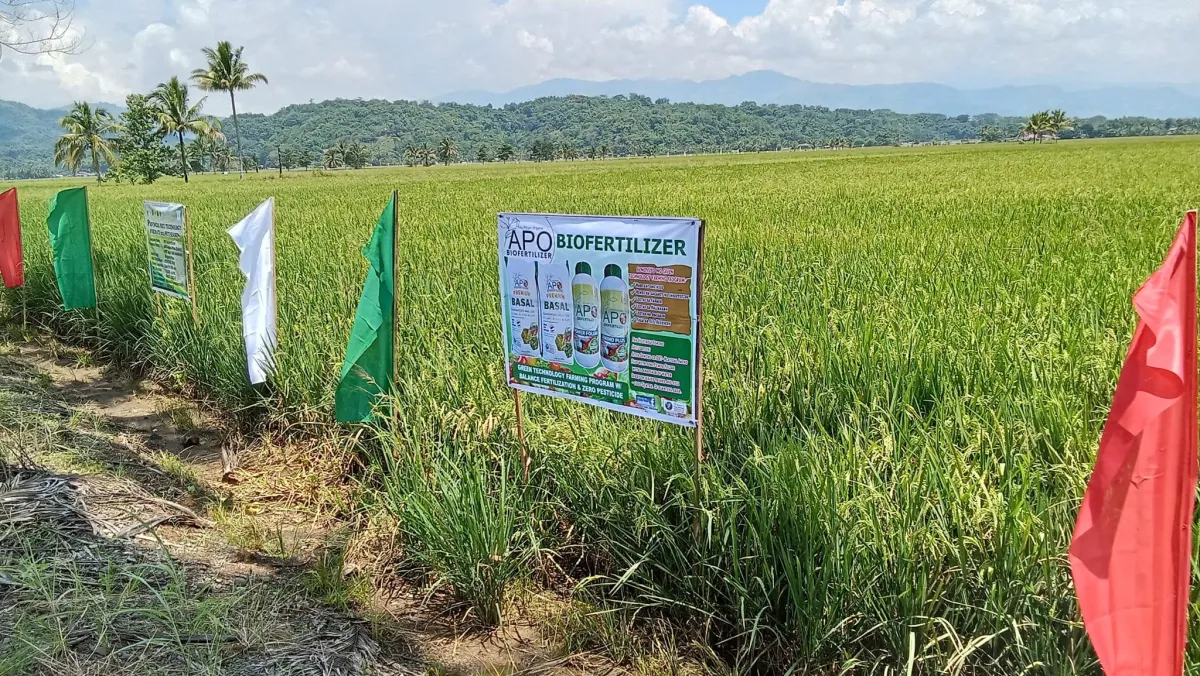
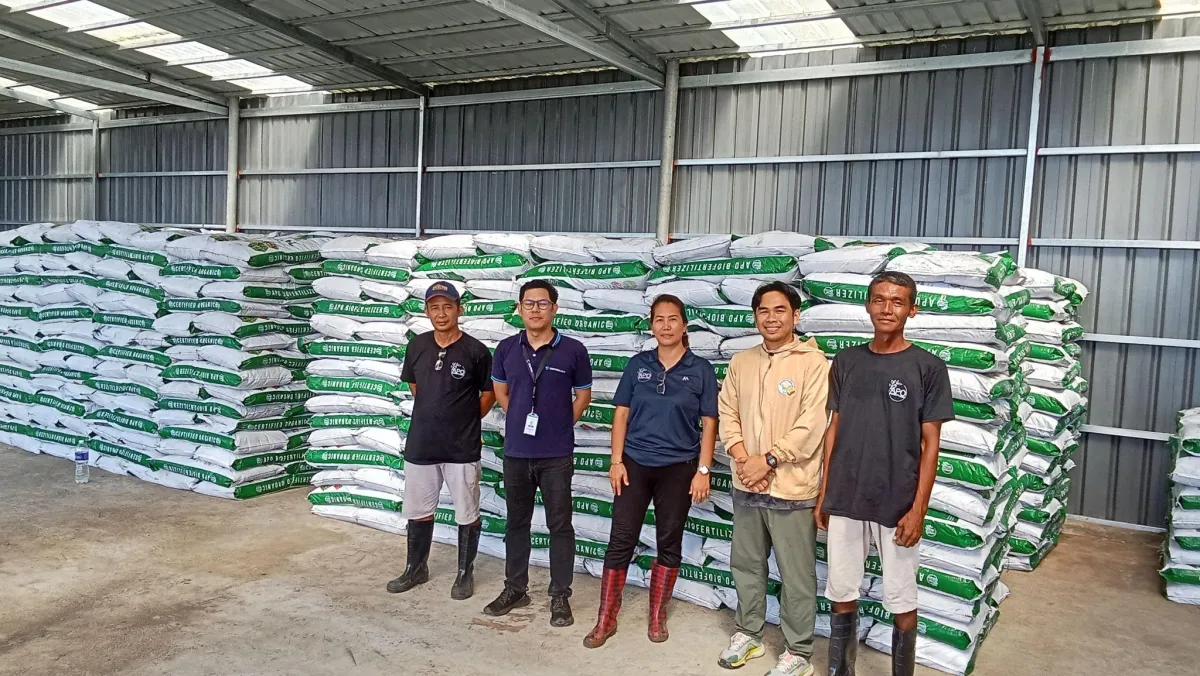
Mission
To empower farmers by providing sustainable organic manufacturing solutions that enhance productivity, preserve the environment, and ensure fair value for their labor. We are dedicated to fostering partnerships that promote community growth, innovation, and a thriving agricultural ecosystem.
Vision
To be the trusted partner of farmers worldwide, driving a future where organic farming and manufacturing seamlessly integrate to create a sustainable, prosperous, and environmentally conscious agricultural industry.
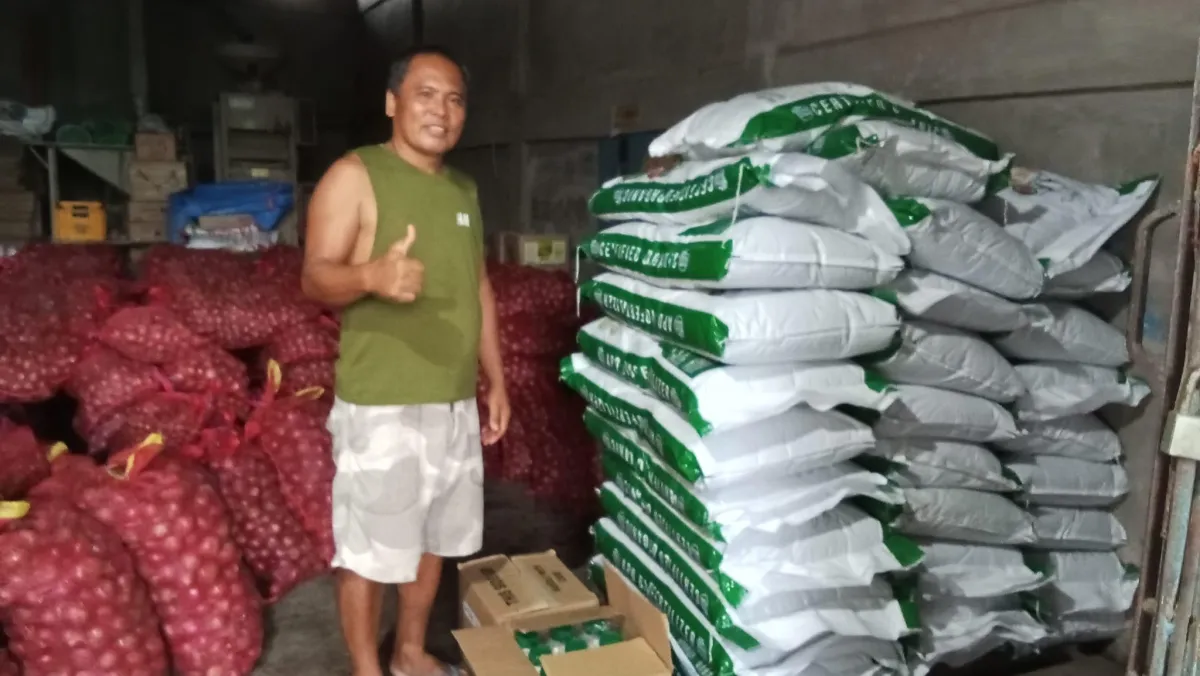

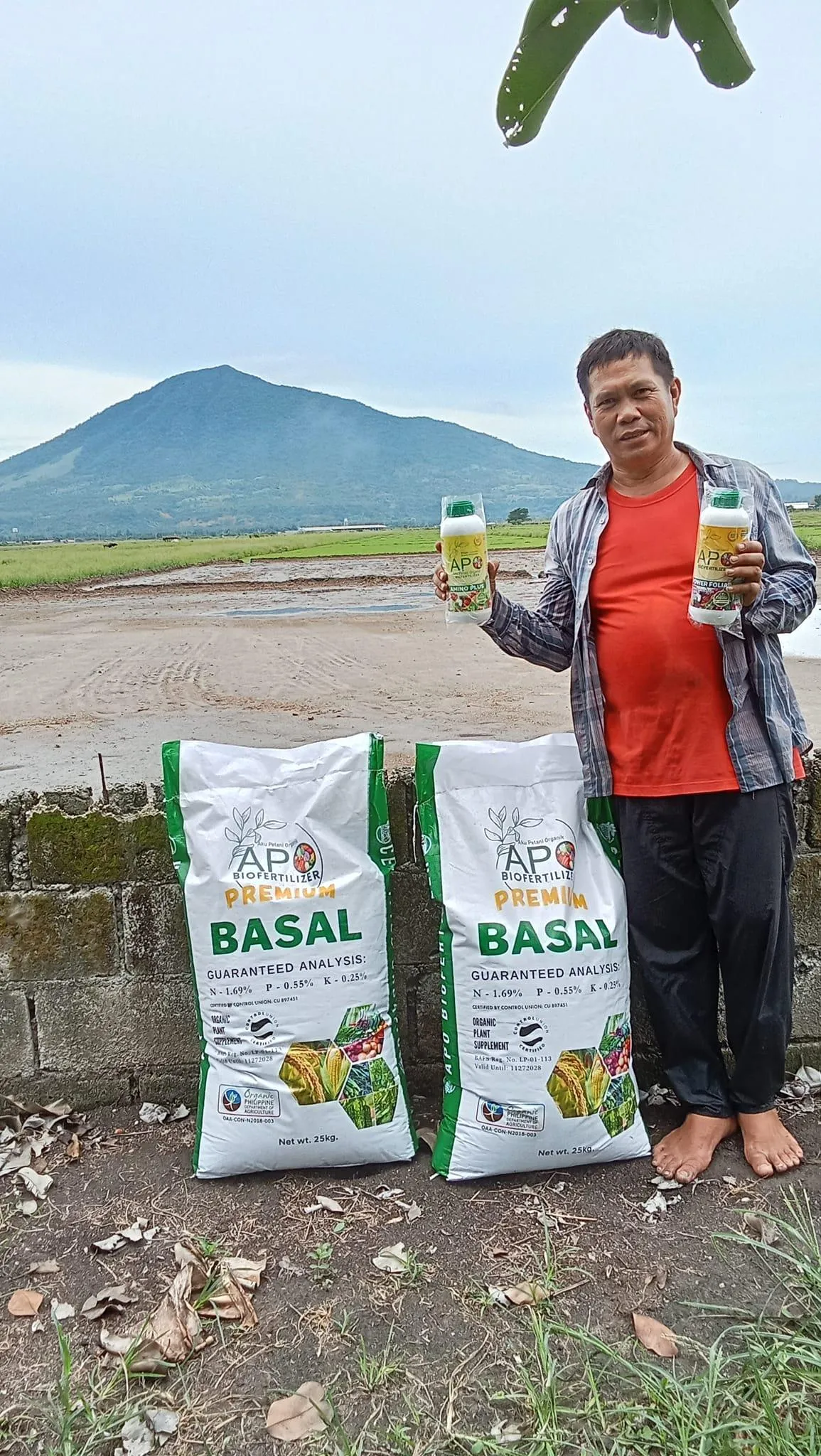
Core Values
Farmer Empowerment: Through continues trainings and workshops regarding the advantage of bio and organic fertilizers, ensuring they receive the opportunities to thrive.
Sustainability: We champion eco-friendly practices that protect the land and secure its fertility for future generations.
Quality: Our products are crafted to enhance farm productivity without compromising natural integrity or quality.
Integrity: We build trust with farmers through continues support and technical assistance buidling reliable partnerships.
Innovation: We develop advanced organic solutions tailored to meet the unique challenges at present time.
Respect for Nature: We care by promoting biodiversity, protecting ecosystem and reducing agricultural carbon footprints.
English Version
What is APO Biofertilizer?
APO is a Certified Organic product with beneficial microorganisms meticulously crafted from renewable sources at APO Manufacturing Plant located in Lunec, Malasiqui, Pangasinan.
What is the use of beneficial microorganisms to plant growth?
Our atmosphere is composed of 78% Nitrogen, however it must be converted into a form that plants can readily utilize. The role of Beneficial microorganism is to convert atmospheric nitrogen by eating them and excreting (poop) ammonia and usable forms of organic nitrogen such as Nitrite and Nitrate.
What are the issues associated with excessive use of synthetic fertilizers?
Water Pollution: Excess nutrients from synthetic fertilizers, such as nitrogen and phosphorus, can leach into water bodies through runoff.
Soil Degradation: Continuous and excessive use of synthetic fertilizers can lead to imbalances in soil nutrients. While these fertilizers provide essential nutrients like nitrogen, phosphorus, and potassium, they may neglect other micronutrients. Over time, this can lead to soil degradation, reduced soil fertility, and decreased microbial activity.
Loss of Biodiversity: The environmental impact of synthetic fertilizers can extend to terrestrial ecosystems.
Greenhouse Gas Emissions: The manufacturing process releases carbon dioxide (CO2), and the use of nitrogen-based fertilizers can result in the release of nitrous oxide (N2O), a potent greenhouse gas that contributes to climate change.
Health Risks: The improper use and handling of synthetic fertilizers can pose risks to human health. Direct exposure to these chemicals may cause skin, eye, or respiratory irritations. Additionally, the consumption of crops grown with excessive fertilizer application may contain higher levels of nitrates, which can be harmful to human health.
Costs and Economic Impact: Overreliance on synthetic fertilizers can be economically unsustainable for farmers in the long run. The costs associated with purchasing and applying large amounts of fertilizers may not be offset by increased crop yields. This can lead to financial challenges for farmers and affect the overall economic viability of agriculture.
How to address these issues?
To address these issues, sustainable agricultural practices, such as precision farming, organic farming, and the use of alternative fertilizers, should be considered to minimize the environmental impact while maintaining soil health and productivity.
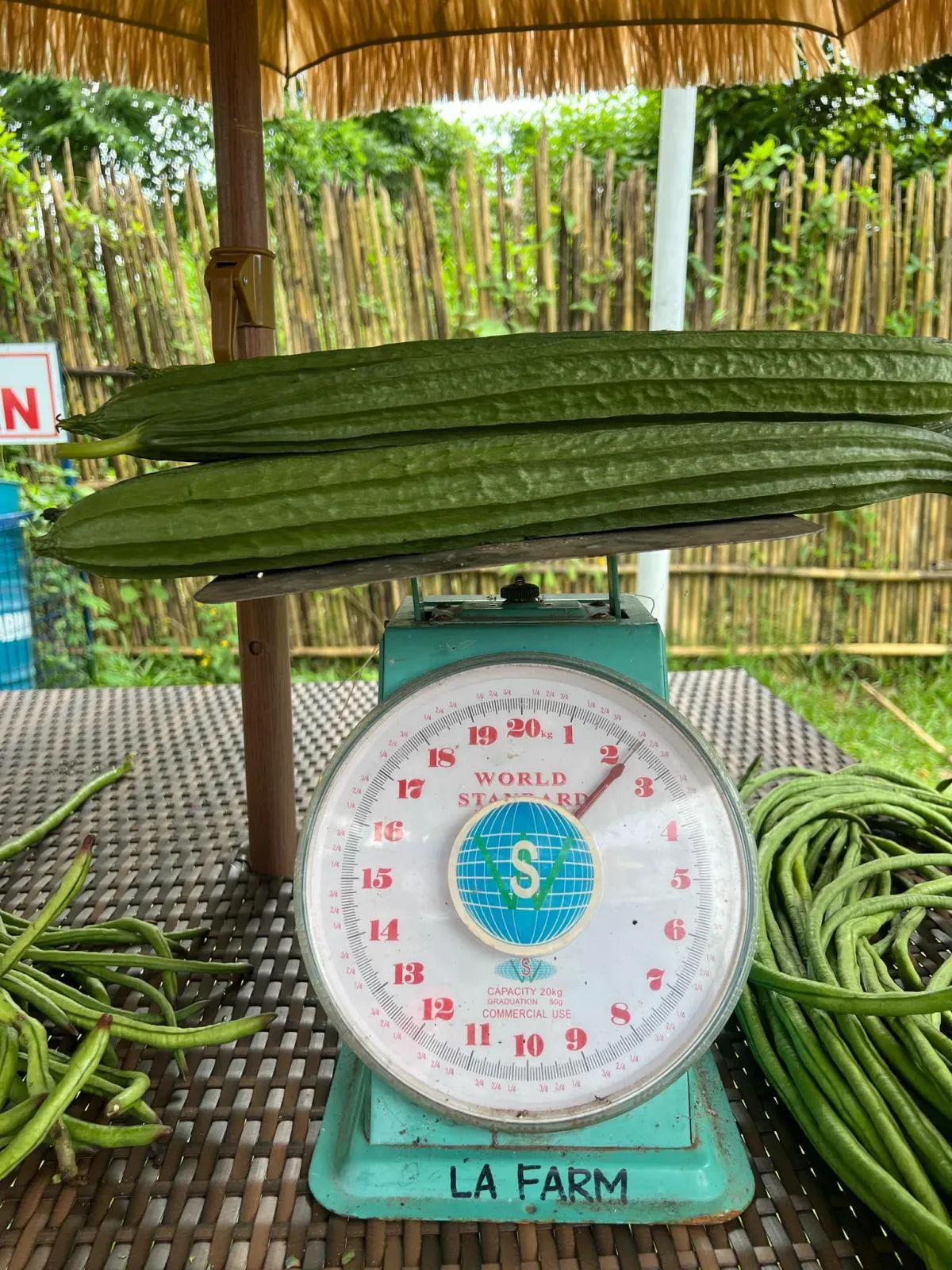
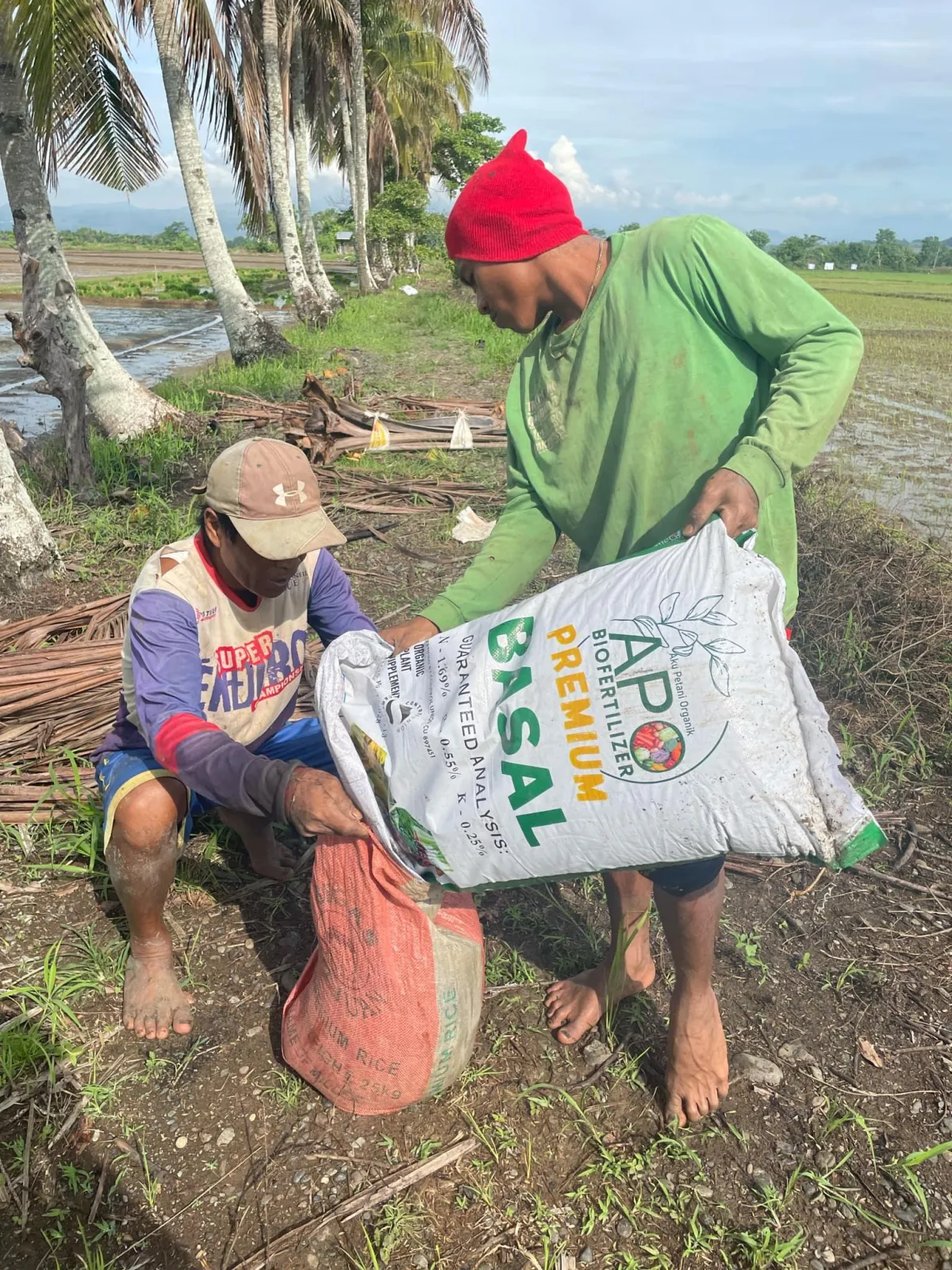
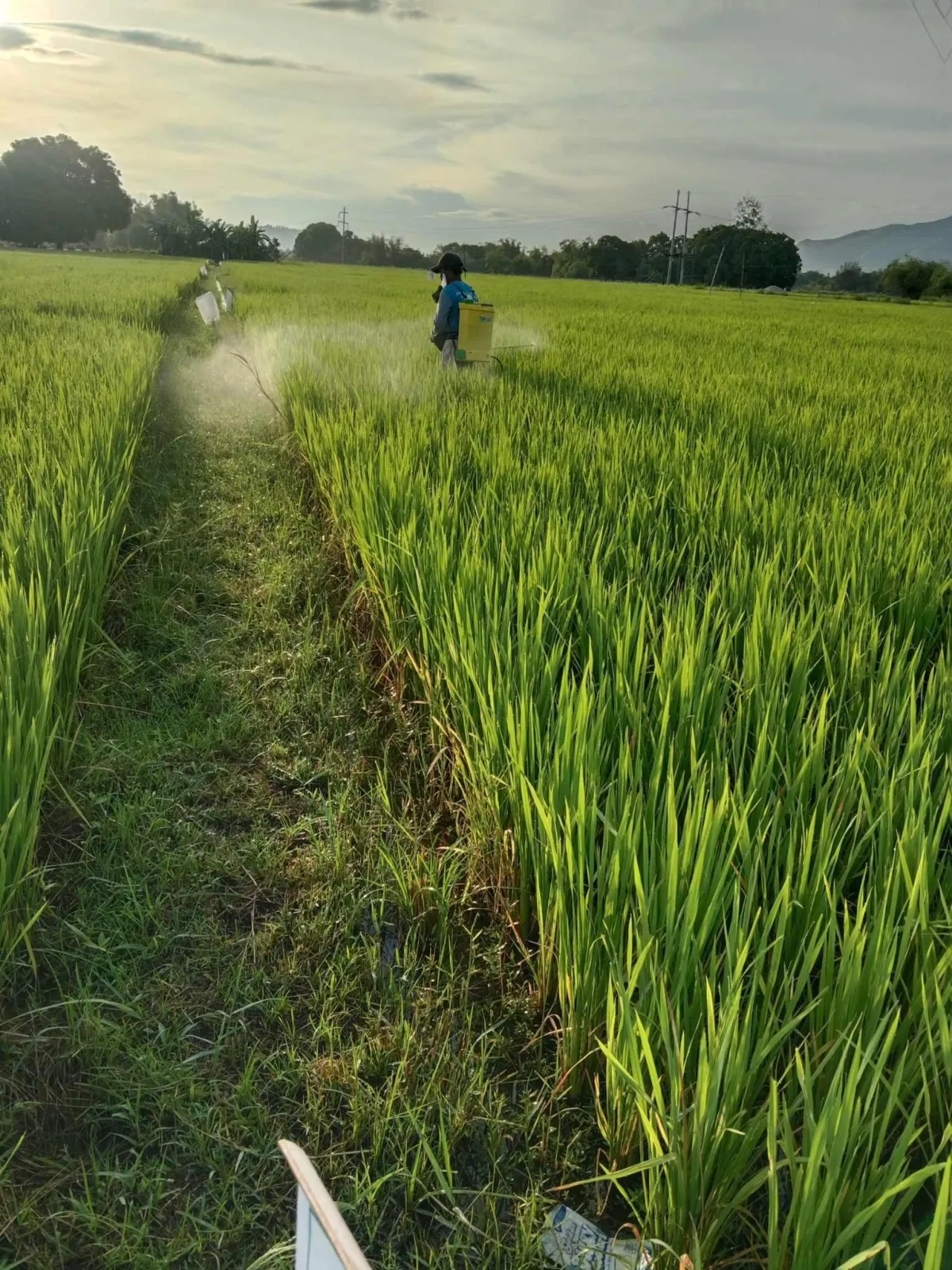
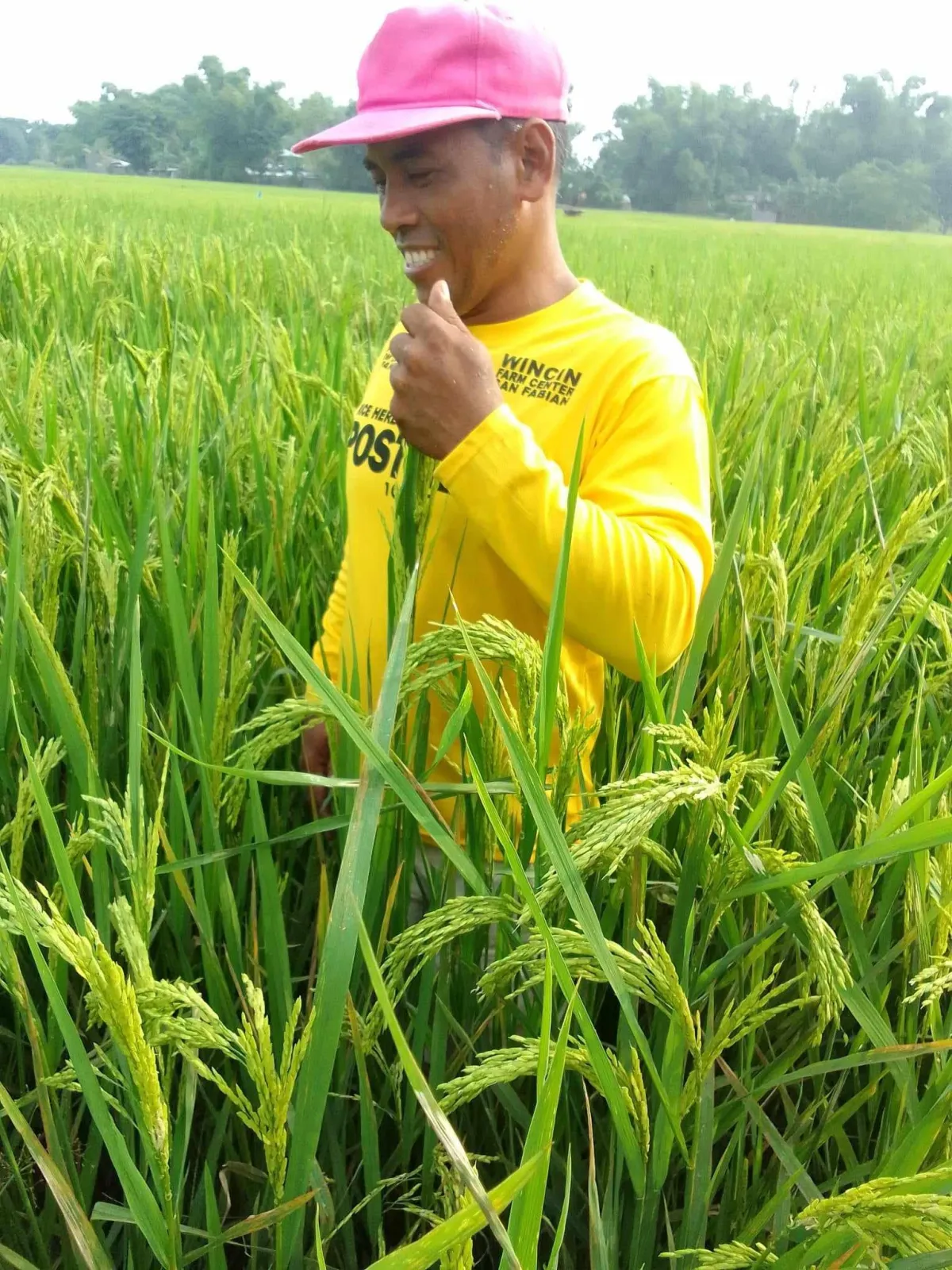
Our Products
APO Biofertilizer - BASAL 25kg
is Certified Organic Plant Supplement BAFS Reg Nos. LP-01-113
containing N-1.69, P- 0.55, K- 0.25
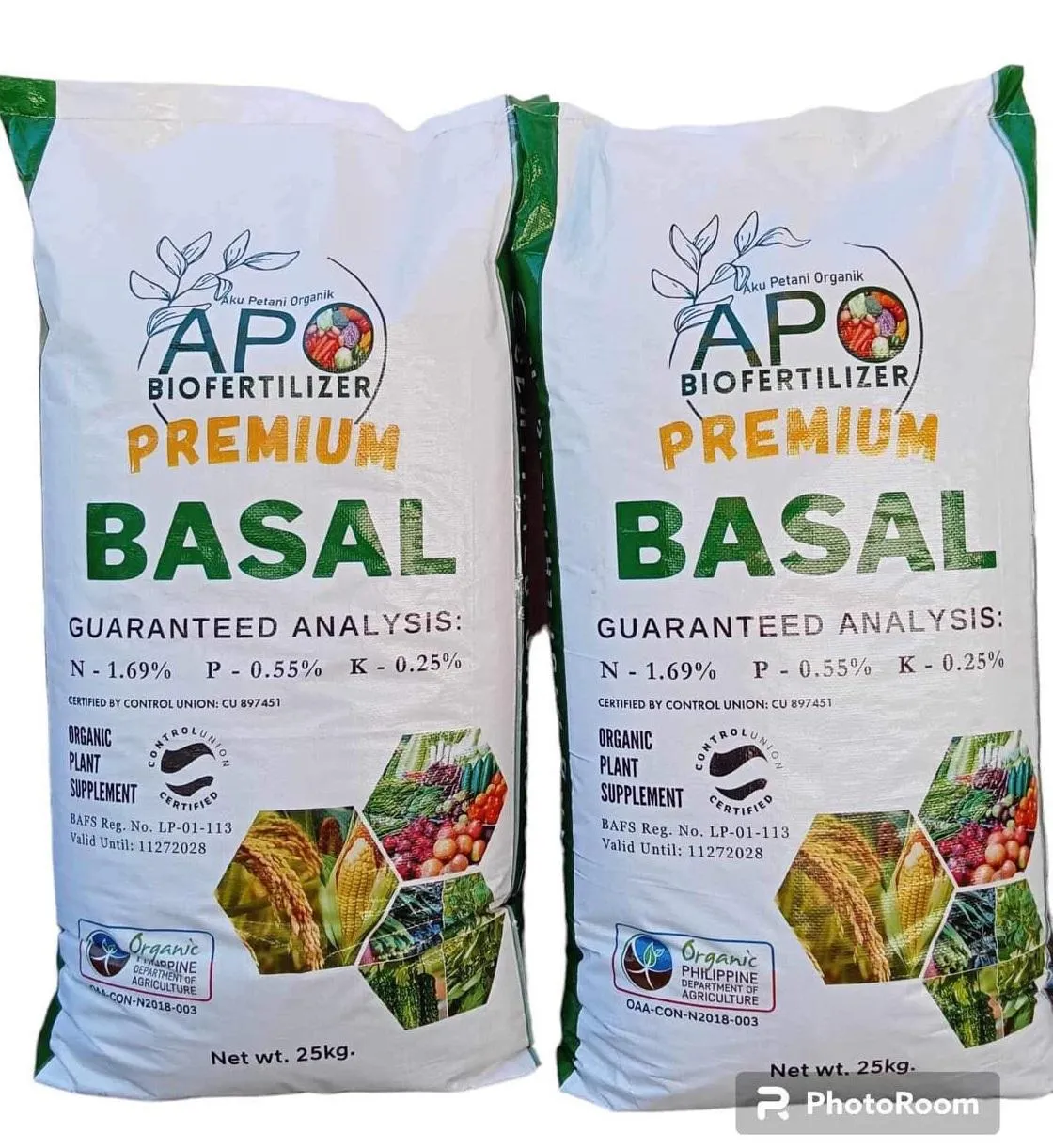
What is APO Basal?
It is an effective soil amendments or soil ameliorants to improve soil quality and plant growth.
APO Basal will increased Soil Fertility as it contains carbon, which serves as a food source for beneficial microorganisms in the soil. These microorganisms help break down organic matter and release nutrients, making them more available to plants.
What is the Special Feature of APO Basal?
APO BASAL contains beneficial microorganisms Bacillus which is a common PGPR in soil that plays a key role in conferring biotic and abiotic stress tolerance to plants by induced systemic resistance (ISR), biofilm formation and lipopeptide production. As a part of bioremediating technologies, Bacillus spp. can purify metal contaminated soil.
Bacillus cause an array of infection from ear infections to meningitis, and urinary tract infection.
Bacillus Subtilis bacteria is non-pathogenic. They are used in plants as a fungicide, and capable of producing toxins to insects.
What is the Requirement per Hectare?
The Minimum Requirement is 5 bags per hectare or 1 bag per 2000 sq m.
The Recommended Requirement is 10 bags per hectare or 1 bag per 1000 sq m., especially if the farm is near irrigated area with plenty of “Kohol” or if soil is acidic.
When to apply?
Preferably, BASAL must be applied as early as Day 1 especially if there are plenty of “Kohol”, however if there is a delay, BASAL can be applied as late as Day 60.
How to apply?
Broadcast 5 bags of BASAL to 1 hectare soil bed ONCE ONLY during Sowing day, or any day from Day 1-60.
What are the Benefits of APO Basal?
1.Foster soil microbial activity
2.More porous soil
3.Retains soil moisture
4.Promotes soil aeration
5.Add zinc to zinc deficient soil
6.Can purify metal contaminated soil
7.Conferring biotic and abiotic stress tolerance to plants.
8.Fungicidal properties
9.Provides organic NPK
10.Anti-kohol for rice sowing. Protecting our Farmer’s from strong chemical that kills even their toenails and fingernails, and irritating their foot skin.
APO Biofertilizer - AMINO PLUS
is a Certified Soil Conditioner under BAFS Reg Nos. LP-01-112
containing N-2.12, P- 0.18 K- 1.66
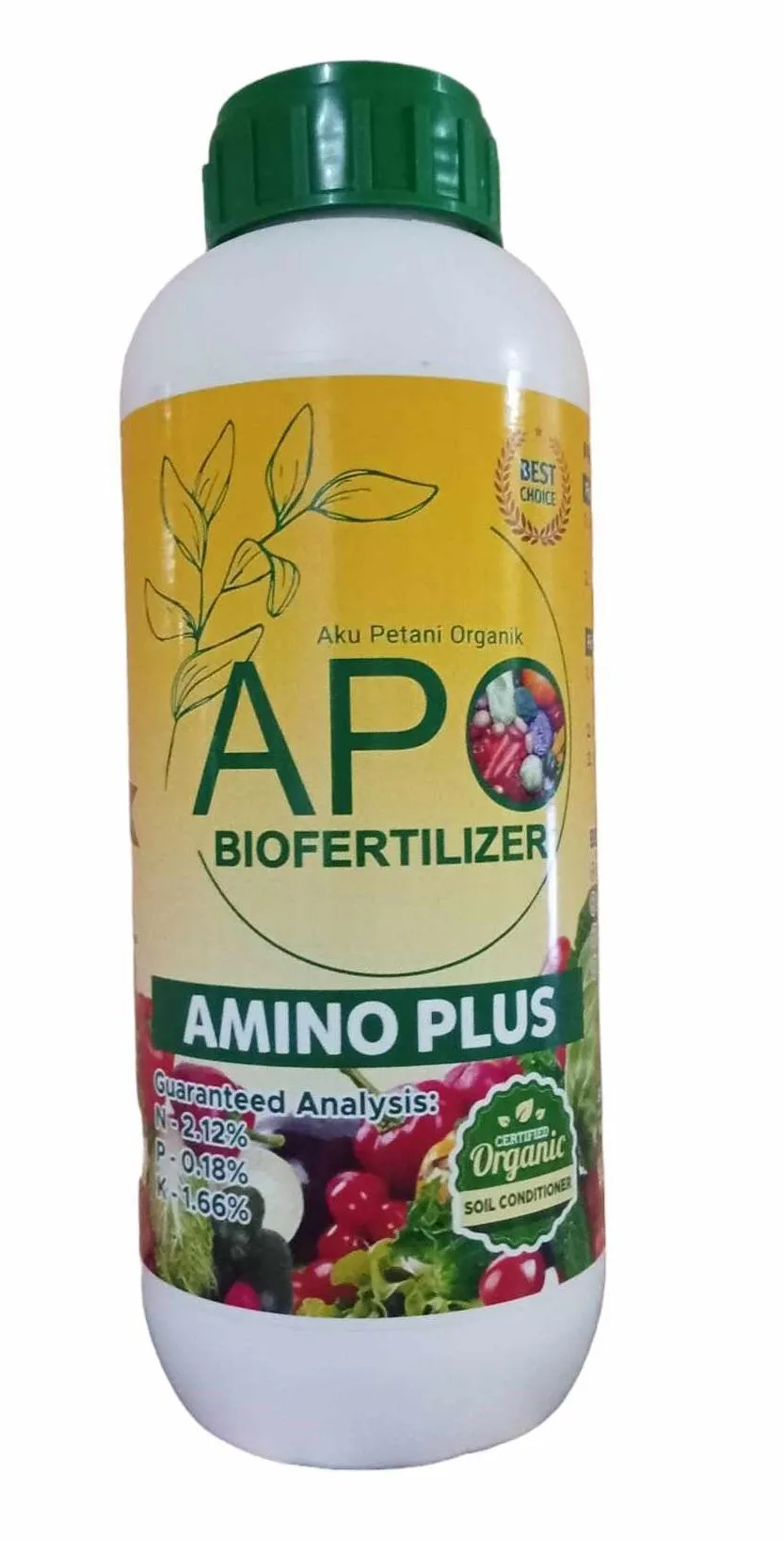
What is the APO Amino Plus?
An effective soil amendments or soil ameliorants to improve soil quality and plant growth during the vegetative stage.
How to apply?
Measure 100ml of APO Amino Plus, mix with 16-20 liters or 1 knapsack of water. Using water from the river or flowing water from other farms is not allowed.
One (1) knapsack mixture must be sprayed to 1,000 sqm. of farm area only.
Ten (10) Knapsack mixture must be sprayed to cover 1 hectare.
What is the minimum application?
APO Amino Plus must be sprayed to sprouting plants and soil, Day 1 after Sowing or DAT.
Then follow up spray every 7 days.
The Minimum Requirement is 2 bottles per hectare or 1 bottle every 2 weeks.
What is the recommended application?
APO Amino Plus must be sprayed to sprouting plants and soil Day 1 after Sowing or DAT. Then follow up spray every 7 days for 3 weeks.
The Recommended Requirement is 4 bottles per hectare or 1 bottle every 7 days.
What are the Benefits of APO Amino Plus?
pH Adjustment: Organic amino acid contains organic acids that can help neutralize the acidity of the soil. The organic acids, such as citric acid and acetic acid, can react with the excess hydrogen ions (H+) in the soil, thus raising the soil pH and reducing soil acidity.
Nutrient Supply: Organic amino acid is rich in nutrients like nitrogen, phosphorus, and potassium, as well as trace elements. These nutrients are essential for plant growth and development.
Microbial Activity: Organic amino acid contains beneficial microorganisms that can enhance soil microbial activity. These microorganisms contribute to the decomposition of organic matter, improve nutrient availability, and help create a more favorable soil environment for plant roots.
Organic Matter Addition: Organic amino acid is an organic fertilizer, and its application to acidic soil increases the organic matter content. Organic matter improves soil structure, water retention, and nutrient-holding capacity. It also serves as a food source for beneficial soil organisms, contributing to overall soil health.
Plant Health and Disease Resistance: The nutrients and organic compounds present in organic amino acid can enhance plant vigor, leading to healthier plants that are more resistant to diseases and pests. Additionally, the improved soil conditions can support a balanced soil ecosystem, which can further suppress harmful pathogens and promote beneficial soil organisms.
APO Biofertilizer - Power Foliar
is a Certified Soil Conditioner under BAFS Reg Nos. LP-01-114
containing N-1.27, P- 0.07, K- 1.47
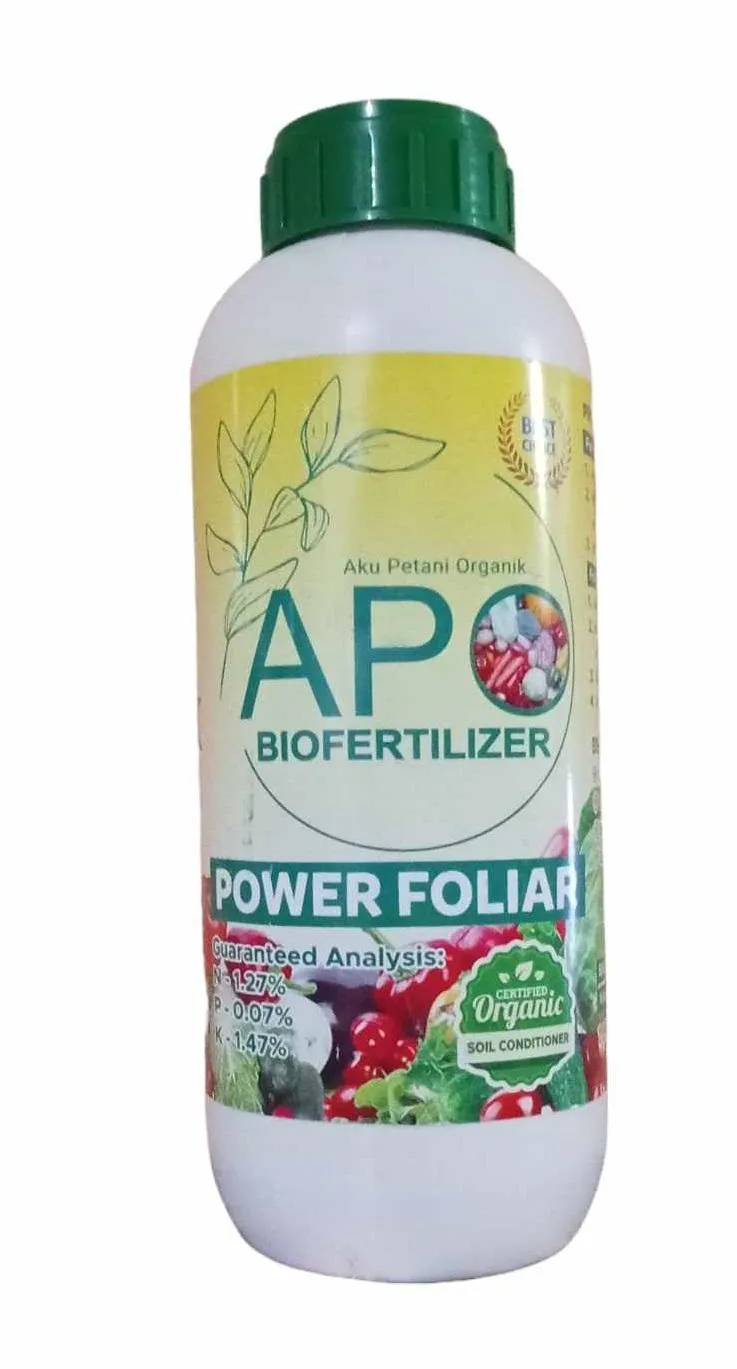
What is the APO Power Foliar?
APO Power Foliar has Fungicidal and Insect repellent properties, an effective soil amendments or soil ameliorants to improve soil quality and plant growth during the maturing, fruiting and flowering stage.
How to apply?
Measure 100ml of APO Power Foliar, mix with 16-20 liters clean water or 1 knapsack of water. Using water from the river or flowing water from other farms is not allowed.
One (1) knapsack mixture must be sprayed to 1,000 sqm. of farm area only.
Ten (10) Knapsack mixture must be sprayed to cover 1 hectare.
What is the minimum application?
APO Power Foliar must be sprayed to sprouting plants and soil during maturing stage or before and after flowering stage. Then follow up spray after 15 days.
The Minimum Requirement is 2 bottles per hectare or 1 bottle every 2 weeks
What is the recommended application?
APO Power Foliar must be sprayed to sprouting plants and soil before and after flowering stage. Then follow up spray every 7 days for 3 weeks.
The Recommended Requirement is 4 bottles per hectare or 1 bottle every 7 days.
What are the Benefits of APO Power Foliar?
Natural Pest Control
Environmentally Friendly
Antifungal Properties
Systemic Effects: meaning it can be absorbed within the plant
Plant Growth Promotion
Low Toxicity to Humans
Green Technology Farming Program
Green Technology Farming Program with Balanced Fertilization
RICE & CORN SOWING
10 Bags Basal
3 Bottles of Amino Plus
3 Bottles of Power Foliar
Application:
On or after Sowing Day– Isabog ang Basal. 1 bag sa 1000 sq m
Day 1 after Sowing or after Transplanting - Spray Amino Plus, 100ml mix with 1 knapsack of water sa 1000 Sq mtrs.
Then After 7 days- Spray Amino Plus, 100ml with 1 knapsack of water sa 1000 Sq mtrs.
Then After 7 days- Spray Amino Plus, 100ml with 1 knapsack of water sa 1000 Sq mtrs.
Then After 7 days- Spray Amino Plus, 100ml with 1 knapsack of water sa 1000 Sq mtrs.
Then After 7 days- Spray Power Foliar, 100ml with 1 knapsack of water sa 1000 Sq mtrs.
Then After 7 days- Spray Power Foliar, 100ml with 1 knapsack of water sa 1000 Sq mtrs.
Then After 7 days- Spray Power Foliar, 100ml with 1 knapsack of water sa 1000 Sq mtrs.
For Rice Sowing: Add 5-8 bags Synthetic Fertilizer (Dry Season)
For Rice Sowing: Add 4-5 bags Synthetic Fertilizer (Wet Season)
For Corn: Add 6-7 bags Synthetic Fertilizer (Dry Season)
What we do
Our experts would conduct workshops and training sessions to educate farmers about the proper application techniques and the advantages of organic farming practices.
We offer technical assistance, sharing our expertise and knowledge to ensure successful adoption and optimal utilization of our organic and biofertilizers.
Trainings & Worksops
Madalas na katanungan:
Pwede ba akong magspray ng herbicide?
Yes, pwede po. Huwag lamang isabay sa pag spray ng APO Biofertilizer. Makakatulong ang Amino Plus para makabawi ang naisabog or naipunla na palay mula sa pagspray ng Herbicide. Ang herbicide ay matapang na gamit na nakakapagdulot ng panghihina sa ating tanim na palay.
Pwede bang gamitin ang tubig sa bukirin?
Hindi po. Kailangan gumamit ng malinis na knapsack at tubig sa ating mixture ng foliar sapagkat maaring makontamina ang ating organic fertilizer ng chemical na gamot.
Pwede ba akong gumamit ng insecticide?
Hindi po, sapagkat ang ating produkto ay mayroon nang bisa upang mapuksa ang mga insekto, peste at fungi.
Our objective
To educate Farmers the benefits of using Organic Biofertilizers and Green Technology Farming Program with Balanced Fertilization.
To eventually reduce the use of synthetic fertilizer by Farmers.
To encourage Farmers in sustainable farming.
How much is one package of
Green Technology Farming Program?
I want to know if the products
are effective.
By incorporating organic fertilizers into corn farming practices, farmers can reduce their dependence on chemical inputs, minimize environmental impacts, and improve soil fertility over the long term. Additionally, organic fertilizers contribute to better crop resilience, making corn plants less susceptible to diseases and environmental stresses.
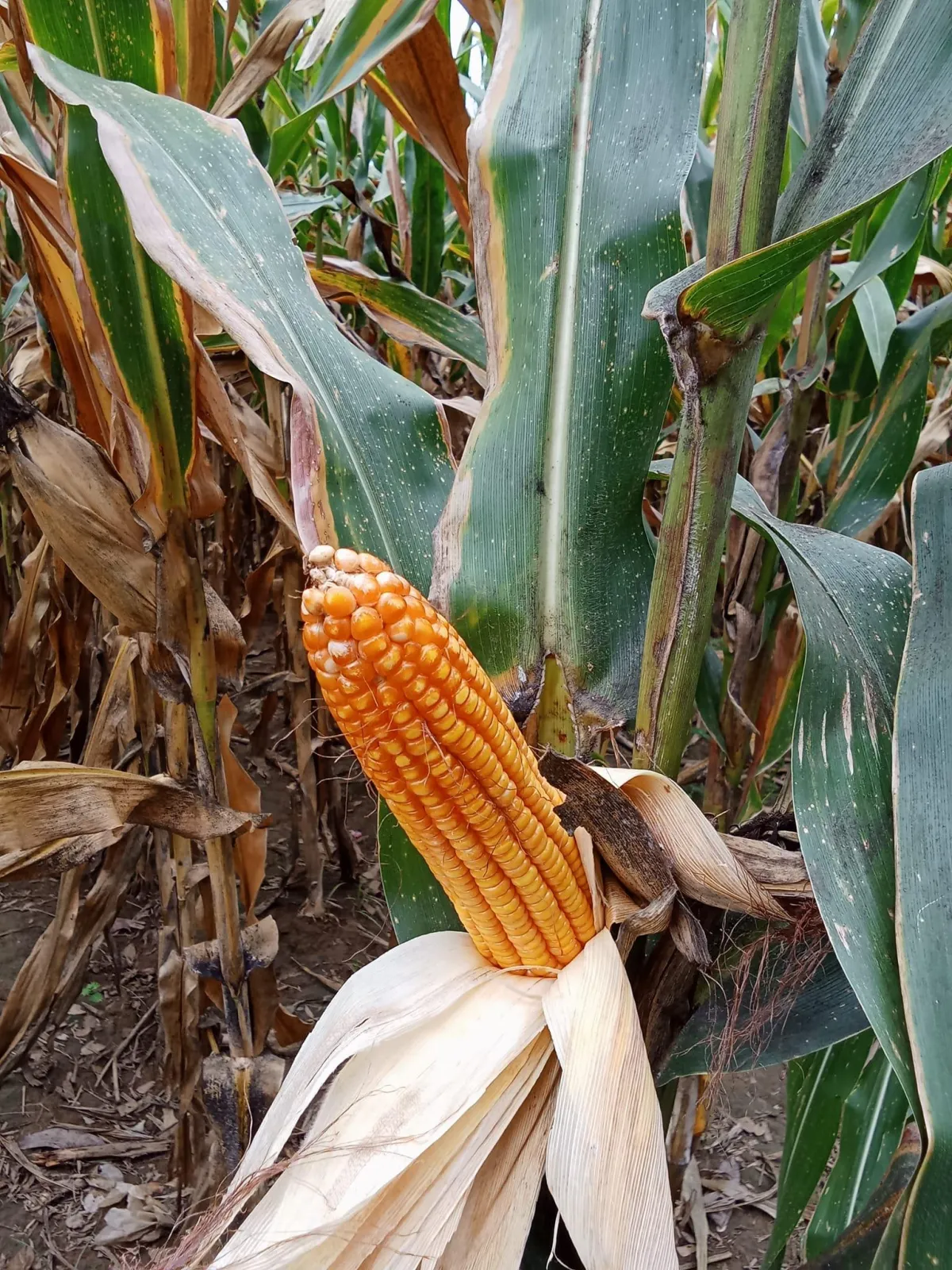
Lowland vegetable farming plays a crucial role in ensuring food security, providing a steady supply of nutritious produce to meet the dietary needs of growing populations. However, maintaining the productivity and sustainability of lowland vegetable farming poses unique challenges due to the high nutrient demands of these crops and the risk of soil degradation. Organic fertilizers have become a cornerstone solution for addressing these challenges, offering both environmental and agronomic benefits.
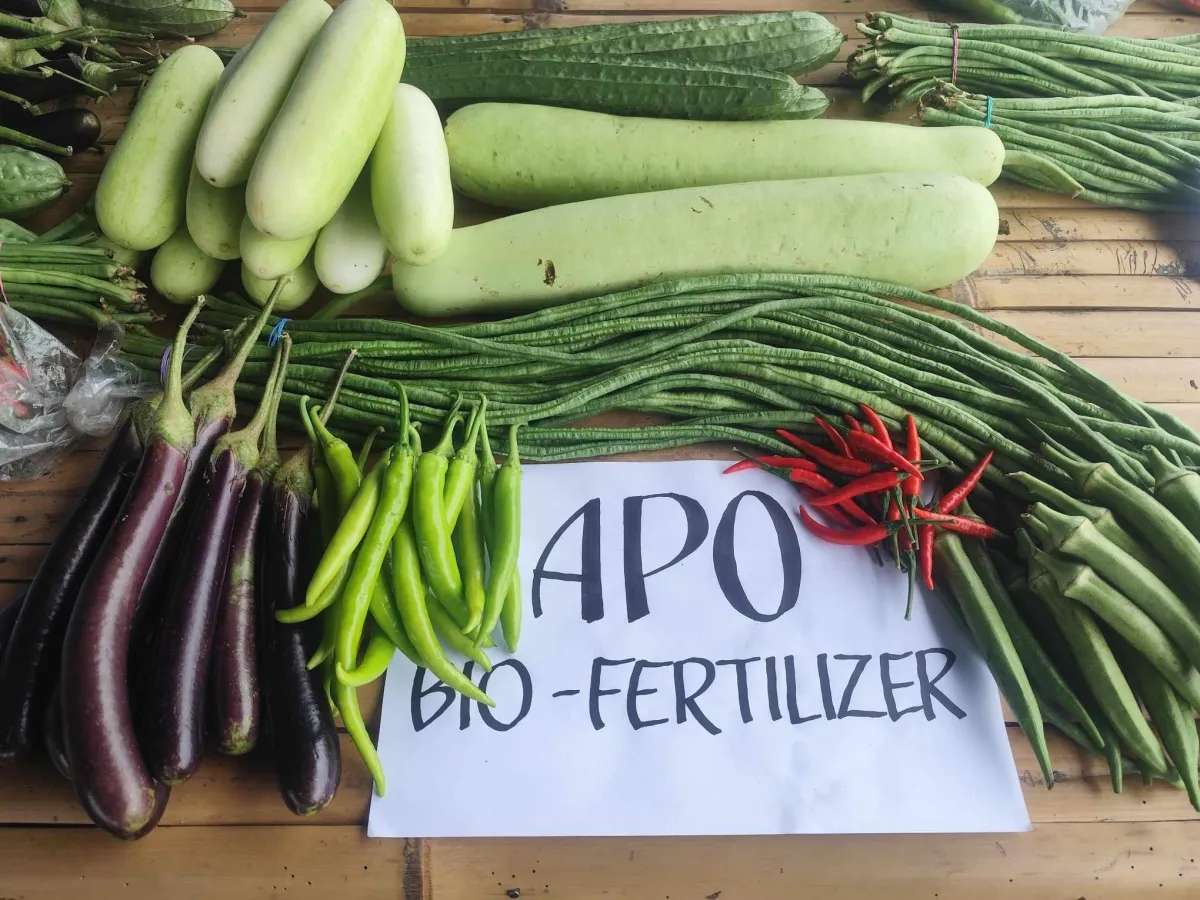
Onions, a cornerstone of culinary traditions worldwide, are not only valued for their flavor but also for their nutritional and economic significance. As a crop that thrives in nutrient-rich soils, onions require a careful balance of essential nutrients to achieve optimal growth, bulb quality, and yield. Organic fertilizers have emerged as a vital tool in meeting these requirements while promoting sustainable agricultural practices.

Rice is a staple crop for more than half of the world’s population, making its sustainable cultivation vital for global food security. However, intensive rice farming often leads to soil depletion, reduced fertility, and environmental concerns, threatening long-term productivity. Organic fertilizers have emerged as an effective and eco-friendly solution to address these challenges while maintaining high yields and promoting soil health.
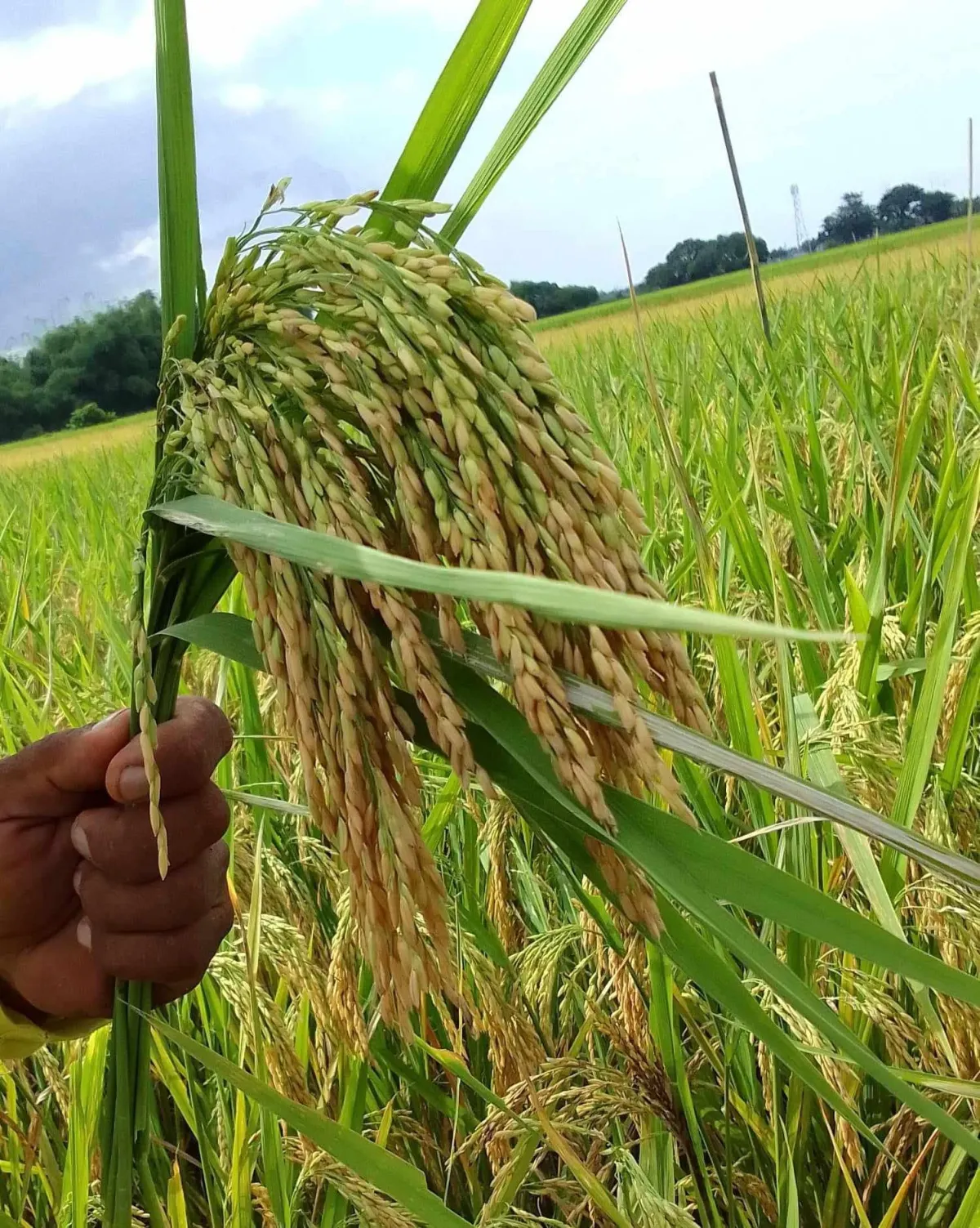
Feed your soil, grow your future.
© APO BIOFERTILIZER 2022 - All Rights Reserved.



